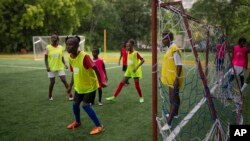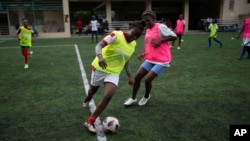They have no sponsors, their training ground had to be closed due to gang violence, and some of their supporters can’t even afford a television. Haiti’s national team qualified for the Women’s World Cup despite all these obstacles, and does not daunted.
Haiti will make its debut at a women’s World Cup in Australia and New Zealand next month after a historic win over Chile brought joy to a country mired in a deep cycle of poverty, violence and political instability.
Midfielder Melchie “Corventina” Dumornay, who plays in France, scored two goals in that 2-1 victory over Chile, in the playoffs played in New Zealand that defined the last three places in the tournament with 32 teams.
“The Haitian team will give itself completely,” said Emmanuel Jean, who managed several players on the squad, such as captain Nérilia Mondésir and Dumornay when they were juniors. “We’re going to see Dumornay show the world what she’s made of.”
Half a century has passed since a Haitian team competed in a World Cup at senior level, with the men’s team at the 1974 tournament in West Germany.
Jean was a coach at a soccer academy in Croix-des-Bouquets, once a sleepy district east of the capital Port-au-Prince and now under the control of a powerful gang. Given the increase in homicides and kidnappings in the area, the authorities ordered the closure of the academy and the women had to travel to the neighboring Dominican Republic to play their matches.
The players at the academy used to train there twice a day and play games on Sundays, Jean recalled. Now, some promises can train at least once a week on a small field that was ceded by the main private school in the country.
“As you can see, we don’t have much, but we do what we can,” Jean said, pointing out the meager kit and uniforms donated by fans.
The school is also in charge of distributing snacks after training sessions.
The program aims to ensure that boys and girls do not fall into the hands of gangs, as well as trying to discover new talent. Its coordinator is James Louis-Charles, the director of physical education at the Union School, who opens the doors of his field on Saturdays. The intention was to have 25 boys, but around 50 have joined, many from the poor neighborhoods located in the nearby hills.
Most are children, including 13-year-old Noah Yann Hilarie. She says that he will not miss Haiti’s matches in the women’s World Cup.
“Suddenly they advance to the quarterfinals, that would be tremendous, unbelievable,” he said. “I hope so”.
Haiti, ranked 53rd in the women’s FIFA ranking, will face European champions England (July 22), China (July 28) and Denmark (August 1) in Group D of the World Cup.
Haitian coach Nicolas Delépine defined it as “the strongest group” in the World Cup in an interview with the French magazine So Foot. But he highlighted the immense support they have in Haiti.
“It’s like a religion. The country has been very bad since the earthquake and a series of hurricanes, so the population is holding on to it,” he told the magazine.
no football in the streets
It is common to see boys playing soccer throughout Haiti, although street games have been reduced due to armed gang clashes that have claimed the lives of hundreds of innocent people in the capital and other areas.
It takes a long time to watch the girls play, and that is something that Louis-Charles wants to change.
“It really is a matter of giving them the opportunity and allowing parents to also understand that girls have the same opportunity as boys to play soccer,” she said. “The boys can leave the house to do whatever they want, and the girls stay at home doing chores.”
Alanda Dorval is one of the few exceptions. The 15-year-old attacker plays up to two hours on the street when she cannot train at the Union School on Saturdays.
“I love scoring goals,” she said, noting that Dumornay is her favorite player and that she looks forward to watching every Haiti game on television.
During a recent practice at the school, Dorval scored five goals in less than 30 minutes, and finished with a broad smile.
Jean watched from the side of the court.
“It was unleashed from the time I was 14 years old,” Jean said of Dorval’s talent. “He played as if he had the experience of an international match.”
Dorva and her partner Dor Neika, 13, follow the women’s team closely and yearn to be professional players.
“I want to be a star like Vinicius,” Neika said, referring to the Brazilian striker for Real Madrid who has been the victim of racist insults in Spain.
With the World Cup in Oceania approaching, Haitian fans like Sheila Privert, who runs a local organization for children with physical disabilities, will watch the games, albeit using her phone because she rarely has electricity at home.
“That’s what I want to see, that the girls continue to grow in this sport,” she said as she watched her seven-year-old son play. “I have a lot of confidence in the team.”
And the team is also excited after defeating Moldova 3-1 in their last warm-up before the tournament.
Mondésir, the first Haitian woman to play professionally in France, told the FIFA website that the team has great faith in its quality, especially its cohesion.
“We are very supportive. We do everything together. We left it all on the court,” she said. “We are warriors. That is perhaps our best virtue”.
Connect with the Voice of America! Subscribe to our channel Youtube and activate notifications, or follow us on social networks: Facebook, Twitter and instagram.





![[Img #74664]](https://thelatestnews.world/wp-content/uploads/2024/12/James-Watson-The-controversial-genius-behind-the-double-helix-150x150.jpg)











